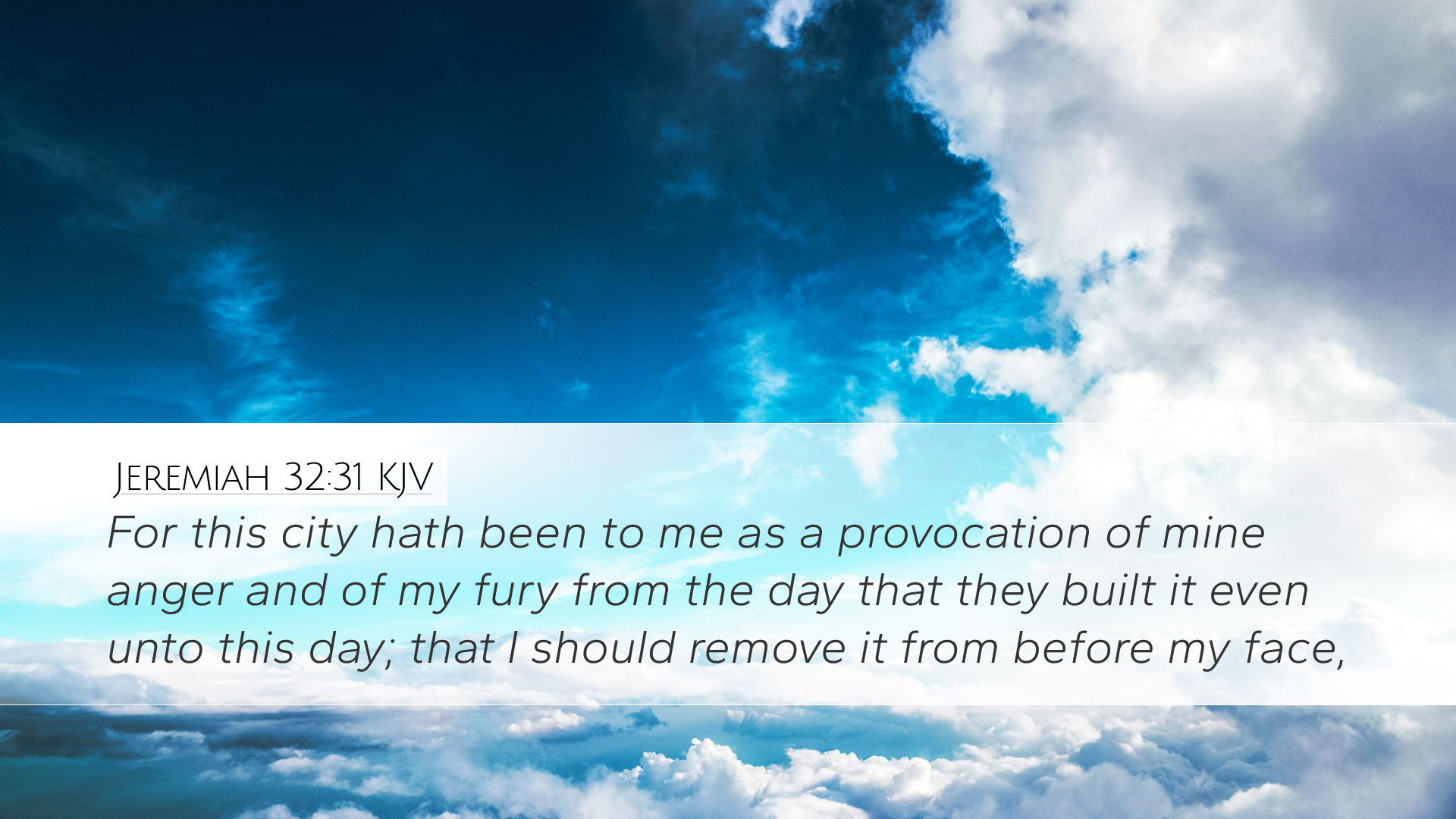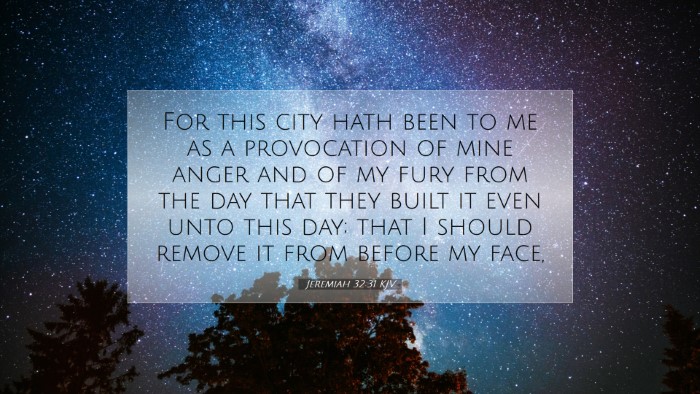Commentary on Jeremiah 32:31
Jeremiah 32:31 states:
"For this city has been to me a provocation of my anger and of my fury from the day that they built it even unto this day; that I should remove it from before my face."
Introduction
The book of Jeremiah is rich with themes of judgment, restoration, and the profound relationship between God and His people. In Jeremiah 32:31, the prophet expresses God's anguish over the persistent disobedience of Jerusalem, which has become a source of provocation. This commentary draws insights from noted biblical scholars including Matthew Henry, Albert Barnes, and Adam Clarke, providing a comprehensive view of the verse's implications.
Contextual Analysis
To understand Jeremiah 32:31, one must first consider its broader context. Jeremiah prophesied during a critical period in Israel's history, just before the Babylonian captivity. This era was characterized by rampant idolatry, social injustice, and a disregard for God’s laws. God's anger was not sudden; rather, it culminated over centuries of rebellion.
Historical Background
Albert Barnes notes that the people of Judah had repeatedly forsaken God, despite His numerous warnings through the prophets. The construction of Jerusalem and its temple, although initially a symbol of God’s presence, had transformed into a monument of their folly. The city became synonymous with rebellion against divine authority.
The Nature of God's Anger
Jeremiah 32:31 reflects the deep emotional turmoil of God over His people’s persistent sin. Matthew Henry emphasizes that God's anger is not arbitrary; it is a response to moral failure. The term "provocation" denotes a considerable level of offense, suggesting that the actions of the people were not only rebellious but also deeply hurtful to God’s nature.
Understanding Provocation
Henry explains that the phrase "provocation of my anger" illustrates how the people’s actions have stirred God's righteous indignation. This provocation arises not just from disobedience but from a rejection of the covenant relationship. Their persistence in sin has made Jerusalem a focal point of divine judgment.
The Consequence of Rebellion
As God articulates through Jeremiah, the city, built with promise and purpose, is now on the brink of destruction. Adam Clarke comments on the profound irony that what was once a place of worship has become a site of turmoil and divine rejection.
Divine Removal
The phrase "that I should remove it from before my face" indicates the ultimate consequence of such rebellion. God’s removal of His presence from Jerusalem would signify a withdrawal of His protection and favor. This leads to the subsequent judgment that would fall upon the city, culminating in the Babylonian exile.
Theological Implications
This verse provides crucial theological insights into the nature of God's relationship with humanity. The distress expressed by God over Jerusalem can be understood as a reflection of His love and commitment to His people. As Barnes notes, God’s lamentation over Jerusalem underscores His desire for reconciliation rather than punishment.
God's Faithfulness Amidst Disobedience
Even amidst imminent judgment, the theme of hope persists in Jeremiah. The prophet reveals that God’s ultimate plan is one of restoration, as seen in the following chapters. This juxtaposition of judgment and hope is critical for understanding God's character—just, yet merciful.
Lessons for Today
The message of Jeremiah 32:31 holds profound implications for contemporary believers. It serves as a reminder of the seriousness of sin and its repercussions. Moreover, it invites reflection on the state of our own cities and communities—are we provoking God through our actions?
Call to Repentance
This verse calls for a heart of repentance. Just as Jerusalem faced the consequences of its rejection of God, so too can any community or individual face similar spiritual ramifications. True followers of Christ are urged to examine their lives and to return to God with sincerity and humility.
Hope Amidst Judgment
Finally, while judgment is a theme in this verse, so is the promise of restoration. God’s deep emotions towards His people are rooted in His desire for a reconciled relationship. Clarke reminds us that repentance opens the door to restoration, highlighting the relentless grace of God, which pursues even the most wayward of hearts.
Conclusion
In summary, Jeremiah 32:31 serves as a poignant reminder of the serious nature of sin and the character of God who is deeply affected by the choices of His people. The insights provided by Matthew Henry, Albert Barnes, and Adam Clarke collectively highlight the multifaceted aspects of this scripture—from historical context to theological implications, culminating in practical lessons for believers today.
As we reflect upon this passage, may our responses be ones of acknowledgment, repentance, and a longing for a closer walk with God, mindful of both His justice and His enduring grace.


